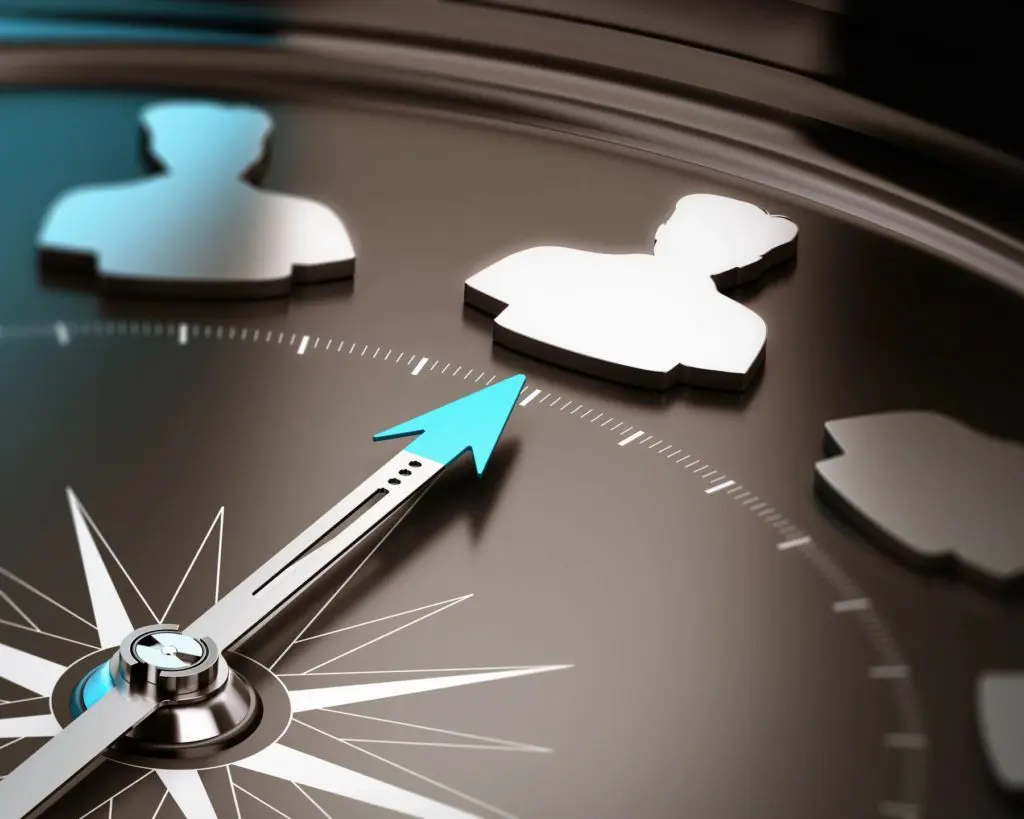
So often in life we get caught up in insignificant matters that really don’t make any difference. Getting caught up in those things takes us off our game; it can be very distracting and unproductive. There’s an art to living life in such a way that you consistently score 3-pointers because you’ve got your game organized to produce high scores. It takes being a bigger person ~ not only in the significant matters, but in the smaller matters as well. Being big about something is an art, it requires skill and thoughtfulness.
Here’s an example ~ the other day I was having lunch with a client at a restaurant near his place of business. After we took a quick look at the menu, the waitress came. I ordered Chicken Romano Salad, which I almost always order at this restaurant, and my client ordered Salmon with Rigatoni. While we were engaged in a great conversation, the waitress came with our meals and placed the Chicken Romano Salad in front of me and a Chicken Romano Salad in front of my client. There was an awkward moment while we looked down and, seeing what had happened, I said, “That doesn’t look like Salmon with Rigatoni to me.” At which point the waitress reached for his plate to make the correction. My client simply said, “No, this will be fine. It’s something new and I’d like to try it.” She made another attempt and he assured her he was satisfied with the plate in front of him.
When she walked away, I looked at him and commented, “My god, that was amazing.” He really didn’t know why I thought so. I told him that “error” would have become a major issue for them making a big scene over it. I have witnessed a meltdown over much less. He said that after I had ordered the Chicken Romano Salad, he wondered if maybe he should try it, too. We both got a laugh and I said, “You willed it here.” Given what had just happened, I told him, “I want to appreciate something about you, Ken, and that is your ability to be a big person and not get hooked by inconsequential things. You focus on what matters. And that’s a great attribute of yours.” I have known Ken for 15 years and have never seen him be anything but dignified and gracious ~ probably why he is so good at his job and such a strong leader. It was a perfect example of someone being bigger than the situation and being a bigger person. It’s easy for any of us to be small. And at the same time, it takes something on our part to be big about anything.
Conversely, I was having dinner with a client recently (who happened to be a woman) and, unbeknownst to me, she had experience in the restaurant business. Consequently, she had pretty high standards and since this was a nice restaurant she felt entitled to expect the highest level of service. But what I noticed and what ensued was a series of tirades correcting the waiter ~ everything he did was wrong. We had ordered slowly, several times actually because she was sure that the waiter didn’t understand what she was saying. He did. Additionally, she had ordered a “special appetizer” that she said would take a while to prepare. She instructed the waiter to serve her Caesar salad before the appetizer. Of course, the appetizer came first. She “ate” the guy. The guy couldn’t have been genuinely sorrier or more apologetic. The salad was soggy. She had ordered splitting two entrees, which she explained three times and spoke to him like he was an idiot. She just lit into the guy and she wouldn’t back off, she just wouldn’t let it go. It was embarrassing ~ I wanted to crawl under the table.
After her third “attack” of this poor guy, she turned on me and said, “Can you see why I’m single?” She was joking, but there was a lot of truth in it. Even she recognized how awful she was being and she could tell that I was uncomfortable…that prompted my making the request that follows. “I have a request of you ~ be nice to the waiter for the rest of the meal. It’s making me very uncomfortable. Would you just be nice to him?” I explained to her that he was just a great waiter and didn’t sign up for the Michelin test tonight. From that point on she was really great to him. She apologized. It took my request that she back off to get her to be the bigger person.
It can go either way. It’s a choice ~ how we react, how we respond to any given situation, is a choice. It takes practice and discipline to develop the muscle I’ll call “being the bigger person.” Generally, we react in fight or flight mode. It’s an instinctive response to protect ourselves from real or perceived threats. But after a few deep breaths, we usually discover that most of what’s coming at us is not a threat at all, and we have a choice about how we’ll respond.
We have an automatic response to “being right” ~ something that is dear to most people. Being the bigger person sometimes means that we apologize even when we’re sure we’re right. It’s a very generous act. At some point we need to consider what’s really important ~ moving things forward or being right? We always have a choice of striking out with our righteousness or letting it go for the sake of what’s possible. Being the bigger person makes you a bigger person.
Kevin Cullen is President of Leadera Consulting Group, specializing in producing breakthrough business results. If you want more on this conversation or the firm, contact us at Leadera Consulting Group.
Kevin Cullen: kcullen@leaderacg.com, cc: acook@leaderacg.com
Read More
| Insights From Kevin | April 23, 2019 |
Have you ever had the shocking realization that something you believed to be true was completely false? You were absolutely sure that something was one way, then you suddenly discovered it wasn’t that way at all; you just thought it was. This certainly happens in life situations, but it also happens in business situations where an assumption was made, decisions were made based on that assumption, which then turned out to be a bad assumption. It could be an assumption about the market, a trumped-up assumption about a buyer’s interest for a product, underestimating your competition. But nevertheless, you place a bet on how you saw that situation and it turned out you were dead wrong. This can be very costly.
Daniel-san, not everything is as seems.
Mr. Miyagi, Karate Kid
Here’s an example ~ and while it’s not a business example, it highlights what can happen when you don’t see the bigger picture. Way back when I was dating someone and early on in our relationship, we took a vacation trip to Kauai (the Garden Isle in Hawaii). Though a small island, Kauai has many different features, including the wettest spot on earth, the dramatic Napali Coast, and Waimea Canyon, which is a mini-version of the Grand Canyon on this small tropical island. The island is very peaceful, serene, and calm; not much commercialism makes it a perfect place to “chill” with a very relaxing vibe.
One day the two of us went for a drive around the island exploring. As we were traveling up one of the winding roads, we noticed off to our right a young couple was just coming out from a trail on the side of the road with big smiles on their faces. The trail looked interesting, so we pulled over and asked them what was down the trail. They said there was a beautiful waterfall down the trail about a mile hike away along the streambed. If we just walked along the rocky bank of the stream, we would find it. So we took our day packs and headed down the trail in search of the waterfall. Just as they told us, after about a half a mile we could hear the powerful rushing sound of what turned out to be an absolutely picturesque waterfall. As we approached, we saw a deep blue tropical pond beneath the waterfall. For a moment we stood there amazed at its beauty. Since no one was there we had this little moment in paradise all to ourselves. And with nobody around we decided to skinny-dip. My girlfriend fancied herself as a bit of a goddess-type ~ you know, the type that wears flowy garments and floral headbands (retro-hippie genre).
This for her was a very sacred moment. She’d be able to be free in nature and be “one with the universe”. My girlfriend happened to be quite attractive and particularly curvaceous. And as she headed out into the middle of the pond where the mist of the waterfall sprayed in the air, she floated there still in nature fully naked. We spent about an hour there together. After some romantic carrying on we dried off, put our clothes back on and headed back up the trail to our car. She exclaimed that this experience was “one of the most extraordinary moments of my life ~ to be alone in a private paradise and to be ‘at one’ with nature”.
We drove up the road about a mile and as we approached the top of the mountain road, we noticed there was a look-out point where about 5 large tourist buses were parked. We were curious ~ something must be interesting. We got out of the car and joined about 100 Japanese tourists loaded with cameras and video cameras who were taking in and recording the sights below. When we peered over the rail what we saw was the very pond we just left. Unbeknownst to us, during our “private sacred time” it was now clear that 100s of Asian tourists were capturing our sacred moments on camera and video. Yes, they were documenting the goddess in all her glory, naked, floating in this exotic pond. My girlfriend’s face froze. She looked like she’d been hit with a Taser. By this time, I was already laughing hysterically and seeing the humor in this, turned to her and said, “You are now a porn star in Japan.” She did not find it funny. Fortunately, this was before the internet and YouTube had taken off, so I don’t think she ever made it onto the social media scene.
However, beyond the obvious, we both learned an important lesson that day. Sometimes how you think a situation is isn’t how it really is. Making assumptions based on what’s in the foreground and not considering what’s in the background and beyond can lead to very surprising and potentially dangerous consequences. Keep your eye on the focus of your project, but step back and see the larger picture in your industry before committing your resources. Sometimes you think it’s one way, but it’s clearly another.
Kevin Cullen is President of Leadera Consulting Group, specializing in producing breakthrough business results. If you want more on this conversation or the firm, contact us at Leadera Consulting Group.
Kevin Cullen: kcullen@leaderacg.com, cc: acook@leaderacg.com
Read More
| Insights From Kevin | March 13, 2018 |
So often we become aware of a problem, or a business issue, or having hired the wrong employee, or some other business mistake. For some unknown reason, we put off dealing with the issue in the moment that we discover it. In hindsight we can all clearly see that when in previous times we’ve waited to handle these issues, things got worse. We all know this. In each case it seems that the issue got exacerbated. Did we think it would resolve on its own? No, of course not. It never does. Never. So why do we wait? What does it take to deal with something with a sense of urgency?
Everyone knows that when you deal with the issue completely, you’ll feel better. You lighten up ~ freedom of expression returns, integrity is restored, taking actions becomes easier, the alignment of action is restored. Things start working again when the company’s core values are alive and well once more.
Awhile back I made a big mistake in hiring someone ~ I hired the wrong person. The mistake I made was not following the process I have in place for successful hiring. Because I knew the person, I made an exception to what I know works and didn’t follow our process, as we’d been friends for many years. It was a very costly mistake ~ it cost a six-figure dollar amount of salary and well over a year’s worth of productivity in our firm. Worse ~ it cost me and the people in our firm our freedom, our creativity, and our time.
In my weak attempts to deal with the issue by doing anything other than what I knew I had to do, I was literally avoiding dealing with it and not communicating. This is the opposite of the design of our company’s culture. The impact of tolerating this became pervasive. And even though I knew, and the employee knew, I had made a really bad choice, I couldn’t seem to let it go. I kept trying to fix a situation that would never work. At the time I didn’t realize how much I had begun to accommodate the person. After some time, I began to notice that there was a cloudiness (a lack integrity). Having things work began to take an enormous effort.
Jack Welch, who was the CEO of General Electric, ran the most successful company in the world at one time. Welch classified managers in four “types”:
Type I
This person shares our values; makes the numbers—sky’s the limit.
Type II
Type II managers don’t share our values; they don’t make the numbers—gone.
Type III
This person shares the values; misses the numbers—typically, another chance, or two.
Type IV
This is the toughest call of all. Type IV is the manager who doesn’t share the values, but delivers the numbers; the “go-to” manager, the hammer, who delivers the bacon but does it on the backs of other people, often “kissing up and kicking down” during the process.
At some point I became aware that the person I had hired fit Welch’s Type II description of a manager ~ they didn’t share the values and they weren’t producing results. The person seemed to operate with an entitlement mentality ~ “what’s in it for me” or “what’s the minimum I can do” seemed to drive their actions. Once I acknowledged the truth about the situation, my choice was clear. They had to go. But it took me awhile. BIG MISTAKE.
So, what is it that keeps us from acting now and making the tough decisions? Maybe what’s at play here is hope ~ the imaginary lure that something might intervene without our efforts ~ that the problem will solve itself. You and I both know that that’s not going to happen. What is required is powerful and decisive action.
Running a successful business requires making tough decisions. Effective action takes honesty and courage. It’s usually uncomfortable. It’s usually hard to do. But that’s what it takes. I once heard that Colin Powell said:
“Bad news is not like wine ~ it doesn’t get better with age.”
Kevin Cullen is President of Leadera Consulting Group, specializing in producing breakthrough business results. If you want more on this conversation or the firm, contact us at Leadera Consulting Group.
Kevin Cullen: kcullen@leaderacg.com, cc: acook@leaderacg.com
Read More
| Insights From Kevin | March 20, 2020 |
Years ago, my boss at the time was a man named Werner Erhard, whose name many of my friends would recognize. He introduced me to a masterful practitioner of an Eastern style practice called Sugi, which is a form of Acupressure developed in Korea. The man’s name was Dr. Choe, and he is a master of the science and practice of the art of Sugi. Dr. Choe is a world-renowned healer who has treated dignitaries around the world, including Emperors, Popes, and other notable leaders. Over the years, I got to know Dr. Choe and as our relationship developed, he began to visit my home in Denver and stay with us for a week at a time. During these visits, he would treat people in Denver – including many of my friends who I invited for one of Dr. Choe’s extraordinary healing “treatments”. Each session lasted 40 minutes and involved deep tissue manipulation, stretching, and even walking on one’s back (which I always jokingly referred to as “Korean Surfing”).
The people who received the treatments found them remarkable and amazing. I personally witnessed several “laying of the hands” that produced unadulterated miracles in people I knew who had their conditions “disappear”. Though Dr. Choe was an older man, he kept a rigorous schedule for his daily treatments – he would get started at 8am and finish up at 6pm with a few breaks. We would have dinner together in the evening and he would sit in the living room with us just talking about various things. He was a wealth of knowledge and wisdom, and in the course of these evening chats he imparted some interesting and insightful things. I loved these precious conversations because I learned so much from him. Once, we were chatting about health and well-being as I was trying to understand how his work with meridians in the body worked so powerfully to free up energy and disappear blockages.
I asked him one night, “Dr. Choe, why is it that some people eat correctly, exercise regularly, drink lots of water, and in general have a healthy lifestyle, yet they can get very sick and in some cases keel over dead in their 30’s from heart failure, while others can live a life of reckless hedonism, eating bad food, smoking, drinking, and surviving on little sleep and live to be 100 years old?” His answer startled me…..he said, “because of worry.” I asked him to say more. He explained that as a rule of thumb, people of means are often less healthy than people who have less possessions and monetary wealth for the simple reason that poorer people have far less things to manage, think about, and worry about. He made his point personal by pointing out that we had two computers, two cars, two televisions, a larger house than most and all the things that go with that. Each thing we accumulate takes attention and care, upkeep, maintenance, and all of those individual things create a certain level of anxiety for a person; more things to worry about. He contrasted this with someone who has half as many “things” and made the point that they only have to be concerned about half as much. He drove it home by saying, “If I have very little possessions, I go outside, I have the sun, I have the earth – I have everything!” but not the worry of those things; I am free, I am relaxed I am not worried.
Dr. Choe said that the word disease literally means dis – ease (not at ease), which he said translates to worry. People who live a simple life are more at ease, less worried, and therefore experience less dis-ease and as a result less stress. He said that stress is the silent killer and that those who worry are prone to stress and therefore they worry and attract disease. He pointed out the obvious benefits of prayer and meditation to quiet the mind, reduce stress, and act as a catalyst for letting go of worry. He said prayer, meditation, moving the body, being in nature all help people to be less stressed and not worry. He went on to talk about the practice of gratitude – being grateful for what I have, for my health, and for the moment is a key deterrent of a worried existence.
Don’t worry – be happy – be grateful – be free.
Kevin Cullen is President of Leadera Consulting Group, specializing in producing breakthrough business results. If you want more on this conversation or the firm, contact us at Leadera Consulting Group.
Kevin Cullen: kcullen@leaderacg.com, cc: acook@leaderacg.com
Read More
| Insights From Kevin | November 2, 2017 |
People have “too much to do”. Ask anybody, they will tell you. There’s more to do than you could possibly ever get done. However, consider this ~ you’re only going to do what you’re going to do today. That sounds like it’s obvious, but most people don’t relate to what they have to do as if that’s the case. Their to do lists are full of things they think they should do or that they “haff” to do, and they think that if they have it on the “list”, they’ll get to it. You’re not going to do all the things you “haff” to do just because it’s on a list. You’re really only going to do what you actually do. The key to what you’re going to do is knowing that actions take place in time. Anything you’re going to do takes a certain amount of time, therefore if it’s not on your calendar it’s not going to get done and it won’t happen. If you don’t schedule real time on your calendar to do the task, including scheduling an appropriate amount of time to do it, it’s almost certain that it won’t get done. Everyone has a long list of things they want to do, should do, and “haff” to do. But when you get into that list, all the things on the list are not necessarily the things you’re going to do. Most likely the only ones you will do are the ones you put on your calendar. What’s on the calendar has the highest likelihood of getting done.
The key to getting things done is to use your calendar, and then do what it says in your calendar. Have you ever noticed you never do what you don’t do and you also never do what you should do because it should be done? You only do what you do. And if you didn’t do it, there’s a good chance you didn’t plan the time to do it ~ the time to do it wasn’t allocated on your calendar. Plan and schedule the things you’re committed to doing ~ distinct from the things you want to do, should do, and “haff” to do. No one has ever done what they want to do, should do, and “haff” to do unless they actually did it.
Giving up the myth of the unending list of things to do, which occurs as a burden, is a powerful step forward in productivity. Being selective and rigorous about what goes into your calendar is the key. When you schedule items be sure to allocate the proper amount of time for every aspect of the task. Otherwise it won’t get done. Though this won’t guarantee that the item will get done, it will significantly raise the likelihood if it’s “in existence”, i.e. in your calendar.
I am impeccable about my calendar. Given what’s on my plate, I have to be. Therefore, I have a practice in place: I schedule what I’m going to do, and I give enough time to get it done. For example ~ I have a meeting at 10:00 AM downtown. On my calendar is “9:15-9:30 pre-meeting briefing”; “9:30 – 10:00 drive time to meeting” (it only takes 15 minutes to get there); “10:00 -11:00 attend and participate in meeting”; “11:00 – 11:30 drive back to office”; “11:30 – 11:45 debrief meeting”. That gives me the time to 1) be briefed, 2) travel, 3) be seated (as opposed to rushing in at the last moment), 4) participate fully in the meeting, 5) return to the office and debrief my notes from the meeting, and 6) send a follow-up to the client. So, while I am only going to a one-hour meeting, in reality ~ in time ~ it takes 2 and half hours to complete everything about that meeting. People don’t live like that.
I have been to thousands of meeting at hundreds of companies. More than half of those meetings start late, and people come in unprepared. They didn’t brief any preparation, and likely didn’t allow enough time to get to the meeting. They’re rushing in to get seated and they’re not prepared to start. The result is they waste others’ time. The meetings are ineffective. Your time is precious. And their time is precious. You get paid to produce results with your time. Relating to and managing your time is a valuable asset that will make you more effective and more productive. Use your calendar as your best tool for effectiveness and productivity. It is an essential skill for any manager and anyone that intends to be a leader. You’re only going to do what you do. And if it’s on your calendar there’s a much higher likelihood you’ll get it done.
Kevin Cullen is President of Leadera Consulting Group, specializing in producing breakthrough business results. If you want more on this conversation or the firm, contact us at Leadera Consulting Group.
Kevin Cullen: kcullen@leaderacg.com, cc: acook@leaderacg.com
Read More